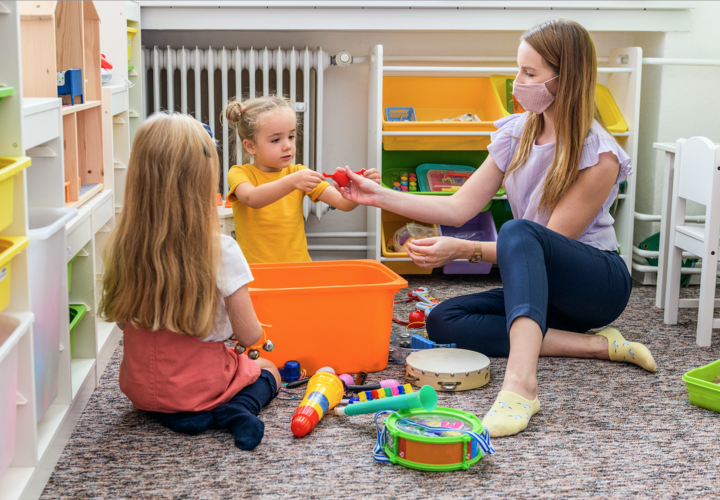Yale Study on Covid-19 and Childcare Provides an “Essential Resource” for Parents, Providers, and Policymakers

An interdisciplinary Tobin Center-supported study has been named by the Journal Pediatrics as one of the Best Pediatrics Articles of 2020.
Childcare is critical to America’s ability to safely return to work, or even work from home. Notwithstanding risk to children is low, parents and providers have been understandably concerned about transmission from young children to adults in childcare settings. To address this pressing concern for parents, children and childcare providers, a cross-disciplinary team at Yale undertook an ambitious, large-scale research project to answer the question. The study finds that children in childcare programs present no significant risk to adults.
Conducted in the spring and early summer 2020, the study is based on the responses of over 57,000 childcare providers and is the largest known survey ever conducted of the American Childcare workforce. First published in Pediatrics, the findings have been broadly covered in the national media, including the Wall Street Journal, The New York Times (twice), The Washington Post, The LA Times, NPR, and NBC (the Today show).
The research has been widely recognized as a key resource in the American early childhood sector and across individual childcare centers nationwide. The nation’s leading childcare association, Childcare Aware of America, created a special online platform to help providers across the country access, understand and act on the findings. Childcare Aware also held a nationwide event with study co-authors with over 3,000 attendees. A trusted partner in the childcare community with vast reach to providers in every state, CWA was a critical partner from the outset, helping Yale researchers collect tens of thousands of survey responses.
“Childcare providers were facing unprecedented challenges and were stepping up despite uncertain risk,” said Lynette Fraga, CEO of Childcare Aware of America. “This research was the first to provide answer and is the largest to date. We were thrilled to spotlight this research in the national childcare community. It has proved an essential resource for providers, parents and policymakers.”
Authors were invited to present findings to the National Governors’ Association, lead agents for childcare in all 50 states, and the Centers for Disease Control, which closely followed the study’s development.
In addition to serving a as a lead funder of the research, Tobin Center brought the work to the attention of Prof. John Eric Humphries, who became a co-PI and played a critical role in in executing the survey and methodologies. “It’s been exciting to engage in a cross disciplinary team on research of immediate use to America’s childcare providers and parents. Childcare also plays a tremendous role in parent’s ability to return to work. As the research continues, there is great promise for the interdisciplinary team to shed light on the role childcare may play for the labor force and in economic re-opening.”
The scale of the survey also presented a unique challenge: with nearly 100,000 respondents collectively generating millions of individual responses. It would take months for a typical research team to simply assess, align and analyze the data. But getting answers quickly was critical for public understanding of the risk and to inform the choices of parents and providers.
To accelerate the research, Tobin activated its rapid response COVID-19 volunteer community, which we built with ISPS to channel social science skills to research with immediate policy applications. Tobin identified, delivered, and funded two student support teams with 16 students reviewers and coders to accomplish the massive task in under two weeks. (Ultimately 57,000 provider surveys were used for the paper, part of what is thought to be the largest occupational-epidemiological study ever conducted.)
“This work highlights the potential of linking faculty and students in economics with colleagues across the university to address pressing issues facing society,” said Tamar Gendler, Dean of the Faculty of Arts and Sciences. “It also showcases the value of bringing the resulting insights to the policy arena by bringing it to the media for broader awareness, and by working with partners in a position to act on the data.”
The research team initially came together thanks to a Yale-wide initiative led by the Medical School to forge interdisciplinary collaborations across the university. “We felt that in bringing together the diverse talent at Yale, the university could have much greater impact in responding to the pandemic,” said Dean Nancy Brown of Yale Medical School. “We’re thrilled to have provided a platform for this cross-disciplinary team to connect and generate new insights on the nature of the disease and that also had great impact for families and childcare providers nationwide.” In addition to Tobin, the research was advanced by Saad Omer, Director of the Yale Institute on Global Health, and led by Prof. Walter Gilliam.